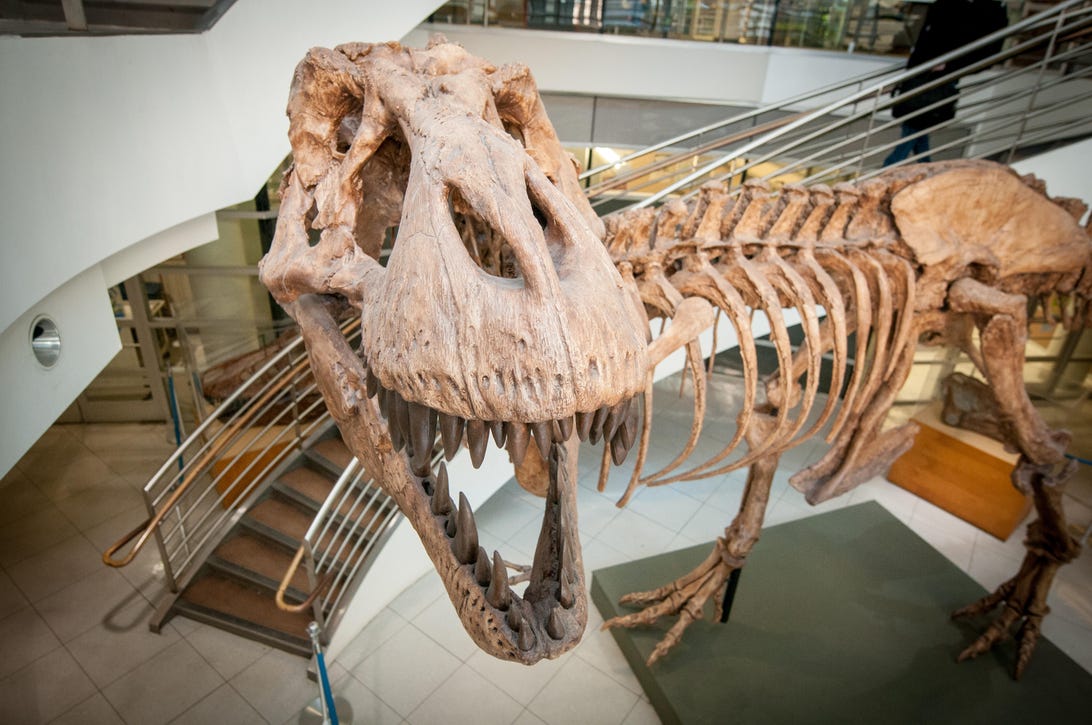
A cast of a T. rex skeleton on display outside the UC Museum of Paleontology at the University of California, Berkeley. The original, a nearly complete skeleton excavated in 1990 from the badlands of eastern Montana, is at the Museum of the Rockies in Bozeman, Montana.
Keegan Houser, UC BerkeleyHumans in our current form have been around for perhaps a few hundred thousand years, what seems like an inconceivably long run in comparison to the lifespan of a single human. But even more mind-blowing is the fact that long before we emerged, Tyrannosaurus rex had its run of the place for over 10 times as long.
Now a new study attempts to calculate exactly how many of the terrifying, thundering lizards may have stomped and chomped their way across the Earth over a few million years. The result: probably about 2.5 billion altogether, but the number could actually be as high as 42 billion.
That high-end number is probably less than half the total number of humans that have ever lived, but it's still a lot of huge, hungry prehistoric predators, especially when we consider what a relatively rare find T. rex fossils are for paleontologists.
"There are about 32 relatively well-preserved, post-juvenile T. rexes in public museums today," said Charles Marshall, director of the University of California Museum of Paleontology, in a statement. "Of all the post-juvenile adults that ever lived, this means we have about one in 80 million of them."
Marshall led the study, published in the latest issue of the journal Science, which fed known data about the extinct beasts into computer simulations to essentially make educated guesses about their total number.
Billions of towering carnivores living over a few million years is still a much lower population density than that of humans today, of course. The study estimates the total population of T. rexes at any given time was probably about 20,000 adults. Clearly nothing compared to the nearly 8 billion human meatbags hanging around today.
But Marshall and his UC Berkeley colleagues estimate a population density of around one dinosaur every 39 square miles (100 square kilometers). That means that, statistically speaking, during the late Cretaceous period you could have expected a T. rex to be within about 7 miles (11.3 kilometers) of your location. Not exactly a safe environment to do much traveling.
However, there are plenty of uncertainties in the estimates that Marshall and his team came up with. While the simulation found 2.5 billion total T. rexes as its best guess, the correct figure could actually be somewhere in a wide range between 140 million to 42 billion.
"In some ways, this has been a paleontological exercise in how much we can know, and how we go about knowing it," Marshall said. "It's surprising how much we actually know about these dinosaurs and, from that, how much more we can compute. Our knowledge of T. rex has expanded so greatly in the past few decades thanks to more fossils, more ways of analyzing them and better ways of integrating information over the multiple fossils known."
The team is also open-sourcing the computer code used in the research, which they hope may allow paleontologists to estimate how many other species might be missed in excavations.
"With these numbers, we can start to estimate how many short-lived, geographically specialized species we might be missing in the fossil record," he said. "This may be a way of beginning to quantify what we don't know."
One thing is certain for at least one person: Putting a quantity to the historical number of T. rexes brings certain nightmares into sharper focus.
Follow CNET's 2021 Space Calendar to stay up to date with all the latest space news this year. You can even add it to your own Google Calendar.
Article From & Read More ( Billions of T. rexes roamed the Earth over their lifetime, new study says - CNET )https://ift.tt/2RDDsd0
Science
No comments:
Post a Comment